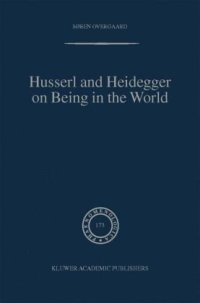
Ebook: Husserl and Heidegger on Being in the World
Author: Søren Overgaard (auth.)
- Genre: Other Social Sciences // Philosophy
- Tags: Phenomenology
- Series: Phaenomenologica 173
- Year: 2004
- Publisher: Springer Netherlands
- Edition: 1
- Language: English
- pdf
It is a study of the phenomenological philosophies of Husserl and Heidegger.
Through a critical discussion including practically all previously published English and German literature on the subject, the aim is to present a thorough and evenhanded account of the relation between the two. The book provides a detailed presentation of their respective projects and methods, and examines several of their key phenomenological analyses, centering on the phenomenon of being-in-the-world. It offers new perspectives on Husserlian and Heideggerian phenomenology, e.g. concerning the importance of Husserl's phenomenology of the body, the relationship between the Husserlian concept of "constitution" and Heidegger's notion of "transcendence", as well as in its argument that "being" designates the central phenomenon for both phenomenologists.
Though the study sacrifices nothing in terms of argumentative rigor or interpretative detail, it is written in such a way as to be accessible and rewarding to non-specialists and specialists alike.
It is a study of the phenomenological philosophies of Husserl and Heidegger. Through a critical discussion including practically all previously published English and German literature on the subject, the aim is to present a thorough and evenhanded account of the relation between the two. The book provides a detailed presentation of their respective projects and methods, and examines several of their key phenomenological analyses, centering on the phenomenon of being-in-the-world. It offers new perspectives on Husserlian and Heideggerian phenomenology, e.g. concerning the importance of Husserl's phenomenology of the body, the relationship between the Husserlian concept of "constitution" and Heidegger's notion of "transcendence", as well as in its argument that "being" designates the central phenomenon for both phenomenologists. Though the study sacrifices nothing in terms of argumentative rigor or interpretative detail, it is written in such a way as to be accessible and rewarding to non-specialists and specialists alike.